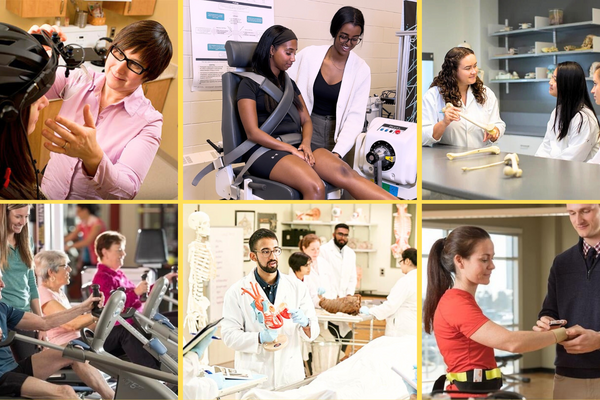
When interests fuel art
Olivia Carvalho (BA ’19) shares how her time at Waterloo shaped her art, and what life is like post-graduation

Olivia Carvalho (BA ’19) shares how her time at Waterloo shaped her art, and what life is like post-graduation
By Olivia Carvalho Alumnus
 When deciding what I would study after high school, I chose Fine Art because it was the thing I knew I would be excited to wake up and do every day (other than baking cakes!). The funny thing about that decision is that I never envisioned myself as a full-time artist hauled up in a studio, working in solitude day after day. At that time, I had a very narrow vision of what I thought the life of an artist would look like, what types of works I would make and where they could be shown.
When deciding what I would study after high school, I chose Fine Art because it was the thing I knew I would be excited to wake up and do every day (other than baking cakes!). The funny thing about that decision is that I never envisioned myself as a full-time artist hauled up in a studio, working in solitude day after day. At that time, I had a very narrow vision of what I thought the life of an artist would look like, what types of works I would make and where they could be shown.
Being an Honours Arts (Fine Art) student at Waterloo, I was really challenged by my professors to make work that was for myself. In the studio-based program, I had the freedom to produce art and art objects that I was interested in, and it led to incredible opportunities both in and outside of school.
In a first year Women’s Studies (now Gender and Social Justice) course, I learned about the Special Collections and Archives in Dana Porter Library, and the extensive collection of photos, documents and objects related to first-wave feminist and suffragette Alice Riggs Hunt. My interest in Alice’s life and career made its way into a printmaking project the very next year. I borrowed text and images from scans of her collected items to produce three relief (wood cut) prints. A set of those prints hung in the President’s Office before finding a permanent home in Special Collections and Archives, with the Alice Riggs Hunt files.

During the third year of my undergrad, I curated a bookwork project that compiled stories about first menstrual experiences. I collected the stories through an anonymous submission form online, printed the pages and hand-stitched them together. My book was later shown in FLOW: The Menstruation Exhibition at THEMUSEUM in Kitchener, where I was invited to be on the artist panel for the show opening last spring, alongside a group of talented, engaged and thoughtful artists who were also interested in talking about menstruation.
My work is most often about people, their experiences and their stories. I love working collaboratively, the synergy that comes from creating new works with other artists and producing works that are meant to be engaged by the public. I approach my practice with a trial-and-error mindset and always start with a topic or theme I want to investigate. Rather than having a dedicated medium, I’m driven by seeing how my concepts take form through research and exploration.

Spending the fall after graduation traveling across Ontario as a Liaison Officer for Waterloo, I had the opportunity to speak with hundreds of students about finding a program they were eager to study in, and one that would allow them to discover that same excitement I found as an incoming student. My days as a Fine Art undergrad instilled in me a testing mindset, and the importance of doing what you love, both as a student and in my life after graduation. I continue to run group painting sessions (something I started doing for various groups across campus in my second year), help students find their right fit in the world of post-secondary education as the Admissions and Recruitment Coordinator at St. Jerome’s University, and look for ways to make art that is meaningful to me. When I’m not at my desk, I can be found working on a photography side hustle with my sister, baking for the love of it and wishing it was summer year-round.
You can view more off my work at www.oliviacarvalho.com, connect with me on LinkedIn or follow me on Instagram @OliviaCCarvalho.
Olivia Carvalho is a proud graduate of the Honours Arts. Having majored in Fine Art, with an Intensive Studio Specialization, her work spans across performance, print, sculpture, video and installation, often mixing art and activism. Carvalho has exhibited at UWAG (Waterloo), THEMUSEUM (Kitchener), and has a set of relief prints in the Special Collections and Archives at the University of Waterloo.

Read more
A Waterloo couple reflects on the campus that shaped their careers, their values, and their love story

Read more
To meet our AI ambitions, we’ll need to lean upon Canada’s unique strengths

Read more
From optometry and pharmacy to public health and therapeutics, Waterloo alumni are powering Canada’s health care sector
The University of Waterloo acknowledges that much of our work takes place on the traditional territory of the Neutral, Anishinaabeg, and Haudenosaunee peoples. Our main campus is situated on the Haldimand Tract, the land granted to the Six Nations that includes six miles on each side of the Grand River. Our active work toward reconciliation takes place across our campuses through research, learning, teaching, and community building, and is co-ordinated within the Office of Indigenous Relations.